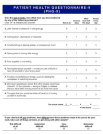.jpg) Critical
incident stress management (CISM) is a type of crisis intervention designed to provide support for those who have experienced traumatic events.
CISM is comprised of multiple crisis response components that attempt address each phase of a crisis situation. It can be implemented with individuals, families, groups, organizations, and
communities. Although some research has found CISM to be ineffective and even harmful, defenders of CISM argue that, when implemented properly, this intervention offers powerful crisis support.
Critical
incident stress management (CISM) is a type of crisis intervention designed to provide support for those who have experienced traumatic events.
CISM is comprised of multiple crisis response components that attempt address each phase of a crisis situation. It can be implemented with individuals, families, groups, organizations, and
communities. Although some research has found CISM to be ineffective and even harmful, defenders of CISM argue that, when implemented properly, this intervention offers powerful crisis support.
Therapy Services
ANGER MANAGEMENT GROUP
Anger Management Group includes required evaluation to determine level of participation starting with minimum three hours, six hours to referral for longer program dependant on the case.
Evaluations scheduled prior to the Group (usually Friday evenings), Groups held on Saturdays monthly to help individuals achieve consistent success in emotional regulation and emphasizes the importance of personal responsibility for one’s behavior. This program uses an approach proven to initiate change in a person’s thinking and behavior.
Research confirms that this approach (CBT) works. This program utilizes interventions from Cognitive Behavioral Therapy and Brief Interventions focusing on FRAMES (Feedback, Responsibility, Advice, Menu, Empathy and Self Efficacy).
The therapist leads the sessions in learning temper and behavior management strategies. Being able to identify the thinking that leads to anger and the interventions that promote health anger management are ultimate goals of the program. Topics include: Know your anger-Expressing your Anger-Managing yourself-Forgiveness-Making Choices
Anxiety
Anxiety Disorders are characterized by mental symptoms including Intense, excessive, and persistent worry and fear about everyday situations and physical symptoms such as Fast heart rate, rapid breathing, sweating, and feeling tired may occur.
Individuals can be referred by Employee Assistance programs, Physicians or as self referral. Initial appointment recommended would be Screening to determine the extent of symptoms, documentation of basic demographic information and discussion of options for continued treatment determined through a more thorough evaluation of how the symptoms are affecting other areas of life.
Individuals with the desire to utilize insurance must provide insurance documentation and receipt of professional disclosure which states the fee structure and privacy notice.
Individuals can schedule a free 15 minute introductory session to determine their needs. These are generally held Mondays 8-11 and Fridays 3-5 feel free to email interest melissatrinitycounseling@gmail.com
Depression
Depression Disorder is characterized by a group of conditions associated with the elevation or lowering of a person's mood, such as depression or bipolar disorder.
Individuals can be referred by Employee Assistance programs, Physicians or as self referral. Initial appointment recommended would be Screening to determine the extent of symptoms, documentation of basic demographic information and discussion of options for continued treatment determined through a more thorough evaluation of how the symptoms are affecting other areas of life.
Individuals with the desire to utilize insurance must provide insurance documentation and receipt of professional disclosure which states the fee structure and privacy notice.
Individuals can schedule a free 15 minute introductory session to determine their needs. These are generally held Mondays 8-11 and Fridays 3-5 feel free to email interest melissatrinitycounseling@gmail.com
Grief/Loss
Grief is a normal response to loss during or after a disaster or other traumatic event. Grief can happen in response to loss of life, as well as to drastic changes to daily routines and ways of life that usually bring us comfort and a feeling of stability.
Common grief reactions include:
- Shock, disbelief, or denial
- Anxiety
- Distress
- Anger
- Periods of sadness
- Loss of sleep and loss of appetite
Individuals can be referred by Employee Assistance programs, Physicians or as self referral. Initial appointment recommended would be Screening to determine the extent of symptoms, documentation of basic demographic information and discussion of options for continued treatment determined through a more thorough evaluation of how the symptoms are affecting other areas of life.
Individuals with the desire to utilize insurance must provide insurance documentation and receipt of professional disclosure which states the fee structure and privacy notice.
Individuals can schedule a free 15 minute introductory session to determine their needs. These are generally held Mondays 8-11 and Fridays 3-5 feel free to email interest melissatrinitycounseling@gmail.com
Critical Incident Stress Management
Stress Management
Stress can be defined as any type of change that causes physical, emotional or psychological strain. Stress is your body's response to anything that requires attention or action. Everyone experiences stress to some degree. The way you respond to stress, however, makes a big difference to your overall well-being.
Individuals can be referred by Employee Assistance programs, Physicians or as self referral. Initial appointment recommended would be Screening to determine the extent of symptoms, documentation of basic demographic information and discussion of options for continued treatment determined through a more thorough evaluation of how the symptoms are affecting other areas of life.
Individuals with the desire to utilize insurance must provide insurance documentation and receipt of professional disclosure which states the fee structure and privacy notice.
Individuals can schedule a free 15 minute introductory session to determine their needs. These are generally held Mondays 8-11 and Fridays 3-5 feel free to email interest melissatrinitycounseling@gmail.com
Trinity Counseling Services LLC
Paneled with Blue Cross/Blue Shield, Aetna, and Cigna
Things to ask you insurance providers
Questions to Ask your Health Insurance Company
when Verifying your “Mental Health Office Visits”
Benefits.
For IN-NETWORK Benefits
How much are the following amounts for In-Network Mental Health Office Visits?
Deductible……$....... Co-pay ……..$....... Co-Insurance………%
Are Mental Health Office Visits “Subject” to this Deductible?
Have I met any portion of my deductible –if any so far? …………
Is there a “Stop-loss” or “Out-of-Pocket” maximum per benefit year?......
Yes/ No How much?..............$
What are the beginning and end dates of my Benefit Period?.............
From: MM/DD/YY….…………….To: MM/DD/YY…..…….
For OUT-OF-NETWORK Benefits:
Do I have any OUT-OF-NETWORK benefits? …….Y/N
How much are the following amounts for OUT-of-Network Mental Health Office Visits?
Deductible……$....... Co-pay ……..$....... Co-Insurance…………%
Are Mental Health Office Visits “Subject” to this Deductible? Yes…No…..
Have I met any portion of my deductible –if any so far?
Yes--> How much? $...... No……
Are there any limits to the number of sessions per Benefit year?
Is there a “Stop-loss” or “Out-of-Pocket” maximum per benefit
year?...... Yes/ No How much?..............$
What are the beginning and end dates of my Benefit Period?..............
From: MM/DD/YY….…………….To: MM/DD/YY…..…….







